The EU-Latin America summit will convene next week in Madrid, but only after the Spanish government, currently holding the EU presidency, rescinded an invitation to the president of Honduras, after some UNASUR leaders threatened to boycott the meeting. In an e-mail interview, Brookings Institution senior fellow and former Vice President of Costa Rica Kevin Casas-Zamora explains the significance of the dispute in the context of EU-Latin American relations. WPR: How would you characterize broader Spain-Latin America and EU-Latin America relations? Kevin Casas-Zamora: Relations between Spain and Latin America are very strong. Besides the historical closeness, there are very powerful economic […]
The Americas Archive
Free Newsletter
The Antarctic Treaty Conference in Uruguay wraps up tomorrow, ending two weeks of discussions between more than 350 foreign officials, on pressing issues such as conflicting territorial claims and environmental threats to the region. In an e-mail interview, Danila Bochkarev, Energy Security Associate at the EastWest Institute, explains the current political climate in the Antarctic. WPR: What is the current territorial status of Antarctica under the Antarctic Treaty, and how would current territorial claims change that? Bochkarev: The Antarctic Treaty of 1959, which relates to all land mass and ice shelves south of 60 degrees south latitude, bans military and […]
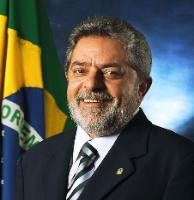
Last week, Brazil’s President Luiz Inácio Lula da Silva was informally tapped to mediate negotiations between Iran and the West over the Islamic Republic’s nuclear program, after Iranian President Mahmoud Ahmadinejad reportedly told his “brother,” Venezuelan President Hugo Chávez, that Iran was prepared to accept Brazilian mediation “in principle.” The starting point for talks will be the same as last fall’s nuclear fuel swap deal, whereby Iran was to ship its enriched uranium to France and Russia for reprocessing, after which the reprocessed fuel would be returned to Iran for use in the Tehran medical reactor. But while Lula is […]
During a summit of the Union of South American Nations (UNASUR) last week in Buenos Aires, the assembled heads of state discussed the possibility of a coup in Paraguay at a closed door meeting called by Paraguayan President Fernando Lugo. In an e-mail interview, Council of the Americas’ Senior Director of Policy Christopher Sabatini explains the significance of the UNASUR meeting. WPR: What about the current political situation in Paraguay would lead President Lugo to believe a coup is imminent? Sabatini: President Lugo has had tense relationships with the military since he was inaugurated on Aug. 15, 2008, largely stemming […]
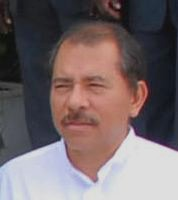
An edgy calm has settled over Nicaragua in the aftermath of political violence that erupted in Managua late last month. During a tense three-day period from April 19-22, supporters of Nicaraguan President Daniel Ortega attacked opposition congressmen — throwing stones and homemade mortars, burning vehicles, blockading roads, and forcibly denying the lawmakers’ entry to the National Assembly, where the legislative body usually conducts business. The immediate cause of the violence was Decree 03-2010. Issued by Ortega in January 2010, the decree allows for a number of public functionaries — ranging from Supreme Court judges to congressmen and electoral commissioners allied […]
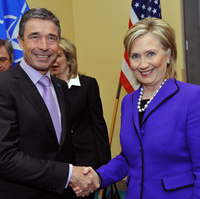
At a recent NATO foreign ministers meeting in Tallinn, U.S. Secretary of State Hillary Clinton said that the United States would not withdraw its tactical nuclear weapons (TNWs) from Europe in the near-term future. Clinton also said that these weapons should only be drawn down if done so simultaneously with similar Russian systems. NATO Secretary-General Anders Fogh Rasmussen echoed these sentiments and stated that U.S. nuclear weapons in Europe are an integral part of the alliance’s deterrent. But in addition to being increasingly unpopular among U.S. allies, the estimated 150-200 U.S. TNWs in Europe (.pdf) also lack military utility and […]
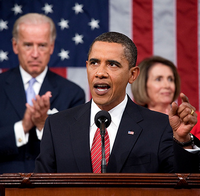
Wired magazine’s May cover presents Bill Gates and Mark Zuckerberg, while the accompanying article salutes the “hacker culture” that “conquered the world.” Amid the political paralysis we now witness in Washington, it’s a timely reminder of how all the top talent of the Boomer generation went into business and technology, while the dregs went into politics. Don’t believe me? Try to imagine a politics-oriented magazine offering a similar cover: You couldn’t get more than half of America to agree upon a single Boomer politician of Gates’ historic stature. Boomer business leaders and technologists rebooted the world, playing seminal roles in […]
Iranian President Mahmoud Ahmadinejad delivered a searing, accusatory speech against the West at the United Nations yesterday, causing many nations — such as France, the U.K. and the U.S. — to walk out before he was done speaking. Ahmadinejad talked about the West’s culpability for the escalation of the international arms race.
I once again had the pleasure of appearing on France 24’s week-in-review program last Friday, “The World This Week,” along with IHT Executive Editor Alison Smales, RFI’s Philip Turle and the Sunday Telegraph’s Anne-Elizabeth Moutet. The subjects were the U.K. election, the Greek Debt Crisis, the oil spill in the Gulf of Mexico, and French President Nicolas Sarkozy’s visit to China. Part one can be found here. Part two can be found here. I’ll also, once again, take the opportunity to add some subsequent thoughts that the discussion triggered. With regard to the British elections, I can’t make any predictions […]
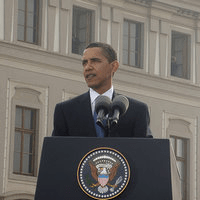
President Barack Obama’s multipronged approach to minimizing nuclear risks — embodied in the simultaneous roll out of the Nuclear Posture Review, the START follow-on treaty with Russia, and the Nuclear Security Summit — is nothing if not ambitious. Taken together, these steps mark a potential turning-point for U.S. nuclear strategy by reducing the role of nuclear weapons and by prioritizing efforts to lock down weapons-usable material, clamping down on nuclear terrorism, and strengthening international rules against proliferation. As the Nuclear Posture Review puts it, “Changes in the nuclear threat environment have altered the hierarchy of our nuclear concerns and strategic […]
